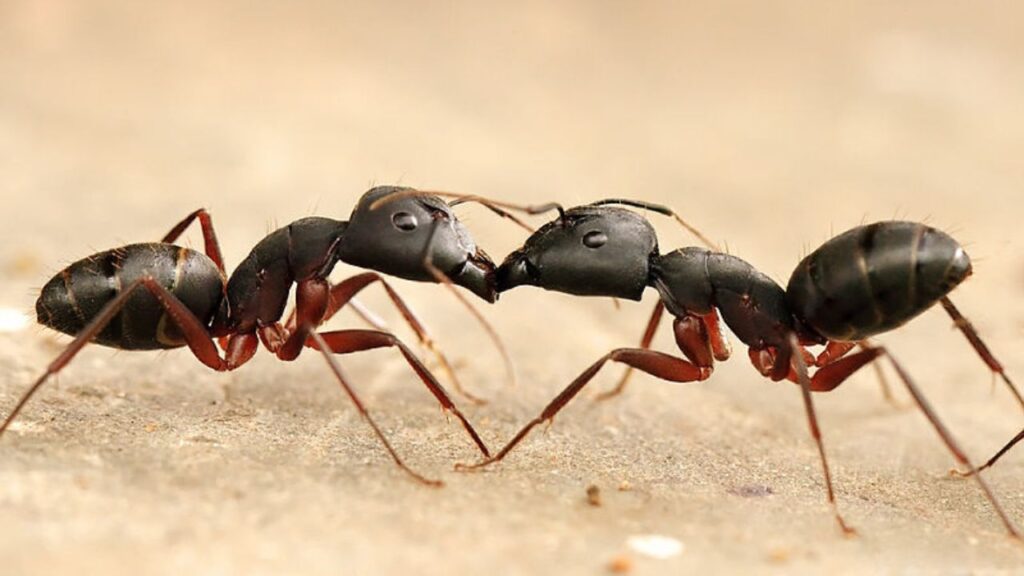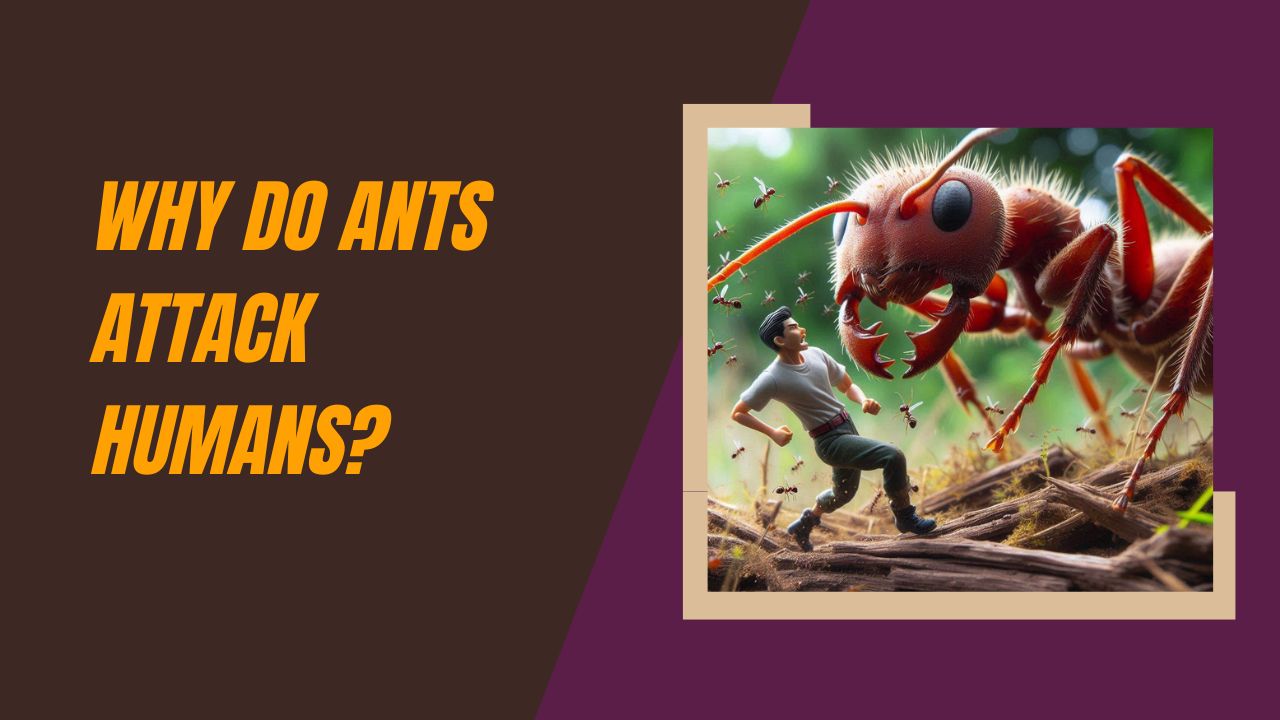Why Do Ants Attack Humans? Ants may attack humans in defense of their colony or when they perceive a threat, such as disturbing their nest.
Ants are some of the most common and widely distributed insects on Earth, found in nearly every environment, from tropical jungles to urban cities.
Despite their small size and seemingly harmless nature, ants can sometimes pose a threat to humans.
Whether it’s a sting from a fire ant or an aggressive swarm from an army ant colony, ant attacks can be painful and even dangerous. [Why Do Ants Attack Humans?]
But why do ants attack humans in the first place? In this post, we’ll explore the reasons behind ant attacks, how to identify aggressive species, and what you can do to prevent these encounters.
Contents
What Are Ants?
Ants are social insects that belong to the family Formicidae. They live in large colonies or nests, which can house thousands to millions of individual ants.
Ants are known for their highly organized societies, where every member has a specific role, such as workers, soldiers, and queens.
They are typically small in size, but their ability to cooperate and communicate effectively has made them successful survivors in nearly every environment.
There are over 12,000 known species of ants worldwide, with a wide variety of behaviors and traits. [Why Do Ants Attack Humans?]
While most ants are harmless and even beneficial to ecosystems by helping with soil aeration and pest control, some species can become a nuisance or pose a threat to humans when they feel threatened or provoked.

5 Reasons Why Do Ants Attack Humans?
Ants do not typically attack humans unless they feel there is a direct threat to their colony. However, when they do attack, it’s usually for one or more of the following reasons:
1. Self-Defense of the Colony
The primary reason ants attack humans is to defend their colony. Ants are fiercely protective of their nests, especially the queen, which is vital to the colony’s survival.
When humans inadvertently disturb an ant colony, whether by stepping on a nest, moving objects close to a nest, or causing vibrations that signal danger, ants will respond aggressively.
Worker ants, who are tasked with foraging and defending, will attack perceived threats to protect the queen and the rest of the colony. [Why Do Ants Attack Humans?]
Ants use various means to protect their nests, including stinging, biting, and releasing pheromones to alert other ants to join the attack.
The entire colony may swarm and defend the nest if they believe the threat is significant enough.
2. Aggressive Species
Some species of ants are naturally more aggressive than others. These ants are often more likely to attack humans, particularly when they feel their colony is threatened. Some of the most notorious aggressive species include:
- Fire Ants: Fire ants are one of the most aggressive ant species. They are known for their painful stings, which they deliver in large numbers if they sense a threat. Fire ants often swarm in defense of their nests and will sting repeatedly, injecting venom that can cause intense pain and, in some cases, allergic reactions. [Why Do Ants Attack Humans?]
- Army Ants: Army ants are known for their nomadic behavior and large swarms. When a human or animal crosses their path, they may attack in massive groups. Army ants don’t establish permanent nests and instead create temporary bivouacs made of their own bodies. They are highly efficient predators, and their aggression is a result of their hunting lifestyle.
- Bullet Ants: Bullet ants are among the largest ants in the world and are famous for having one of the most painful stings of any insect. They are typically found in Central and South America, where they are known for their potent venom. Bullet ants are very aggressive when disturbed and will defend their nests fiercely.
These aggressive ants are equipped with powerful stingers and venom that can cause intense pain, swelling, and allergic reactions. [Why Do Ants Attack Humans?]
While they are not out to attack humans specifically, their natural tendency to protect their colony makes them a danger when humans inadvertently encroach on their territory.
3. Provocation and Threat Perception
Sometimes, ants will attack simply because they feel provoked. Ants have highly developed sensory systems, and even slight disturbances near their nests or trails can trigger a defensive response.
This includes vibrations, sudden movements, or even changes in the surrounding environment.
If you accidentally step on or near an ant nest, the ants may perceive this as a threat and retaliate by stinging or biting in self-defense. [Why Do Ants Attack Humans?]
In some cases, ants will bite or sting out of fear rather than actual aggression. For example, if they feel trapped, cornered, or startled, they may use their stingers as a means of escape.
Although these attacks are typically not life-threatening, they can still cause discomfort and lead to allergic reactions in some individuals.
4. Food Defense
Ants are opportunistic feeders and are constantly searching for food sources. When they encounter a human eating or drinking, they may perceive this as a potential food source and swarm to it.
Some species of ants, like sugar ants, are particularly attracted to sugary foods, while others will go after greasy or protein-based foods.
If you inadvertently leave food exposed or drop crumbs near an ant nest, ants will quickly flock to the area in search of a meal.
While these encounters may not necessarily be hostile, ants can become aggressive if they feel they need to defend the food source from other ants or perceived threats. [Why Do Ants Attack Humans?]
5. Nest Protection
Disturbing an ant nest is one of the most common ways ants attack humans. Whether you are walking barefoot on the ground or working in your garden, disturbing an ant nest can cause an immediate defensive response from the ants.
Most ant species, including fire ants, will aggressively defend their nests against invaders, even if the intrusion is accidental.
When an ant nest is disturbed, the worker ants immediately go into defense mode and may sting or bite to drive off the threat.
If you are attacked by ants in a location where their nest is hidden, such as in the grass or under a pile of leaves, you may not even realize that you are standing near a nest until it’s too late. [Why Do Ants Attack Humans?]
Types of Ants That Attack Humans
While not all ants are aggressive, there are certain species that are more likely to attack humans. The most well-known aggressive species include:
- Fire Ants: As mentioned earlier, fire ants are one of the most notorious aggressive species. They are found primarily in the southern United States, Central and South America, and parts of Australia. Fire ants attack by stinging multiple times and are known for their painful, burning sensations.
- Bullet Ants: Bullet ants are large, aggressive ants found in tropical areas of Central and South America. They are infamous for their painful sting, which can last for several minutes. The pain is described as excruciating, resembling the sensation of being shot, which is how the ants got their name.
- Army Ants: Army ants are not territorial but are known for their swarming behavior. These ants can attack anything in their path, including humans, when they feel threatened or when their food sources are being challenged.
These species are more likely to attack when their nests or food sources are disturbed. [Why Do Ants Attack Humans?]
While these encounters are usually avoidable, knowing which ants are more dangerous can help you steer clear of potential attacks.
How to Prevent Ant Attacks
While it’s impossible to completely avoid all encounters with ants, there are several steps you can take to minimize the risk of being attacked:
- Avoid disturbing ant nests: Be mindful of your surroundings when walking, especially in areas where ants are known to live. If you see ants swarming in an area, try to avoid disturbing their nests. [Why Do Ants Attack Humans?]
- Protect food sources: Keep food stored properly and avoid leaving crumbs or open food containers outdoors. Ants are attracted to sugary and greasy foods, so make sure to clean up after meals.
- Wear protective clothing: If you’re hiking or spending time in an area where aggressive ants are common, consider wearing long pants and socks to protect your skin from potential stings.
- Use insect repellents: In areas where aggressive ants are common, using insect repellents can help keep ants away. Some repellents contain natural ingredients that are effective in deterring ants.
See Also: Do Monkeys Attack Humans? The Truth!
FAQs
Do all ants attack humans?
No, only certain species of ants, like fire ants and army ants, are aggressive toward humans. Most ants are harmless. [Why Do Ants Attack Humans?]
How painful is an ant sting?
The pain varies depending on the species. Fire ant stings are known for their burning pain, while bullet ant stings are considered some of the most painful insect stings.
Are ant bites dangerous?
In most cases, ant bites are not dangerous, but they can cause discomfort, allergic reactions, and, in rare cases, infections.
What should you do if stung by an aggressive ant?
Clean the sting site with soap and water, apply a cold compress to reduce swelling, and take antihistamines if needed. Seek medical attention if you experience an allergic reaction.
Can ants infest my home?
Yes, ants can infest homes in search of food or water, especially if food is left exposed. Sealing cracks and cleaning regularly can help prevent infestations.
Conclusion: Why Do Ants Attack Humans?
Ants attack humans primarily in defense of their colony or when they perceive a threat. [Why Do Ants Attack Humans?]
While most ants are not aggressive, certain species, like fire ants and bullet ants, are more likely to attack when provoked.
Understanding why ants attack can help you avoid dangerous encounters and protect yourself from painful stings.
By being aware of your surroundings and taking precautions, you can reduce the risk of ant attacks and enjoy a safer, more peaceful environment.

Hello, I am Rosa Ellis, a mother of two and a wildlife blogger. I grew up in New York City, but I love exploring forests. I’ve traveled to places like Yellowstone National Park and the Amazon Rainforest to see animals up close. I know a lot about animal behavior and which animals can be dangerous to humans. Thanks for visiting my blog!

